Glory and fury - Liverpool, Boston and a tale of two teams
Last updated on .From the section Football

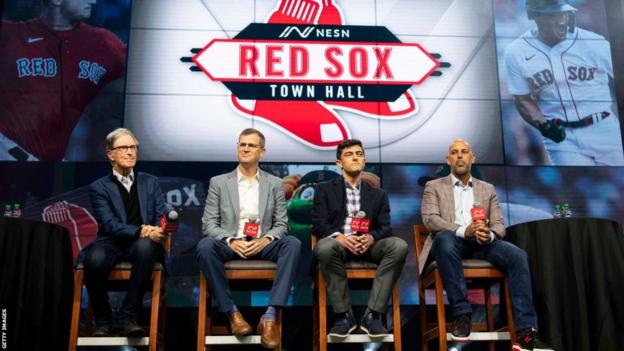
Sign up for notifications to the latest Insight features via the BBC Sport app and find the most recent in the series.
The boos came as soon as John Henry started his answer. "It's expensive to have baseball players," said the 74-year-old in his soft, raspy accent.
On the evening of 20 January, it would not be the first, or last, time that jeers would fill the air of a Massachusetts casino.
After being pitched a question about why Boston Red Sox tickets were so expensive, Henry had to pause three times to allow the dissent to subside and finally explain his thoughts.
The die-hard Red Sox fans, who had turned up at the team's annual 'Winter Weekend' event to hear from players and officials, were not shy in making their feelings known as Henry sat on a bar stool on the stage.
The Red Sox have won four World Series titles in the past 20 years - more than any other team in Major League Baseball over that time - but the fanbase is far from content. And Henry, principal owner of Fenway Sports Group - which owns the Red Sox and, among other things, Premier League football club Liverpool - was the target of much ire.
The next day, across the Atlantic, Liverpool played out a dour 0-0 draw with Chelsea at Anfield. It was the Reds' only Premier League point during a terrible January, which wrecked their hopes of a top-four finish.
They were knocked out of the FA Cup at Brighton the following weekend, and a 6-2 aggregate defeat by Real Madrid brought the end of their Champions League campaign and their last hope of winning a trophy.
For a constituency of Liverpool fans, blame for the disappointing season lay with FSG.
The owners have been on the front foot on both sides of the Atlantic.
In an exchange of emails with the Boston Sports Journal in February, Henry said there was a "false narrative" around the Red Sox and FSG's spending on the team.
A month later, he spoke to the Liverpool Echo.
"Our efforts every day have been and continue to be focused on the long-term health and competitiveness of the club," Henry said.
"Investment in the club is never for the short-term." He added: "Our commitment remains stronger than ever."
It hasn't convinced everyone.
Liverpool and Boston may be separated by an ocean but are united by a common complaint from a section of supporters - that miserly ownership is holding their team back.

Much has been made of similarities between Liverpool and the Boston Red Sox since FSG, then known as New England Sports Ventures, acquired the former in 2010.
From the cities' Catholic and maritime roots to the storied histories of Anfield and Fenway Park - both of which have been renovated under FSG's watch - the parallels are prominent.
Both teams have also experienced cathartic title wins since being bought by FSG.
Liverpool won the Premier League for the first time in the 2019-20 season, ending a 30-year wait to be champions of England. Their triumph had echoes of the Red Sox ending their 86-year World Series drought in 2004 - three seasons into Henry's ownership.
You would be forgiven for thinking on-field success brought the story full circle. But sport never stops, next season is always just around the corner, and, for some, the goodwill these victories bought FSG has run out.
"I would say the Red Sox ownership has the lowest approval rating in the city of Boston out of all the four major sports," said Jared Carrabis, host of the Red Sox-focused Name Redacted podcast, who was on the same stage as Henry at Winter Weekend.
"Which is crazy, but that's definitely the case."
In Carrabis' estimation, ending 'The Curse of the Bambino' by winning the World Series in 2004 gave Red Sox ownership "about 10 years of good grace, because they won again in 2007".
Many of the current frustrations centre on the team's payroll and decisions to let star players leave.
The Rex Sox wage bill for 2023 ranks 13th in MLB, having been sixth in 2022 and 2021. In 2018, when the Red Sox last won the World Series, they had the highest payroll in baseball.
By contrast, according to Forbes, Boston are the third-most valuable MLB business while the Team Marketing Report calculates that the Red Sox are the most expensive baseball team to watch.
That discrepancy has fuelled discontent.
"I would agree that there is a very vocal group of people that are very passionate and frustrated with how the team has spent over the past five to seven years," Jen McCaffrey, who covers the team for the Athletic, said.
How FSG's team in Merseyside spends is a similarly contentious issue.
Liverpool's net transfer investment over the past decade ranks ninth in the Premier League, according to figures released by research institute CIES Football Observatory in September.
West Ham United, Aston Villa, Newcastle United and all of the Reds' established top-six rivals ranked above them. Liverpool's total of £395.3m was little more than half of Manchester City's and less than a third of Manchester United's.
"There's a perception that they're not ambitious enough," said Gareth Roberts of the Late Challenge podcast.
"That they are too conservative, that they are, in some way, handcuffing Jurgen Klopp, who is undoubtedly one of the best managers in the world."
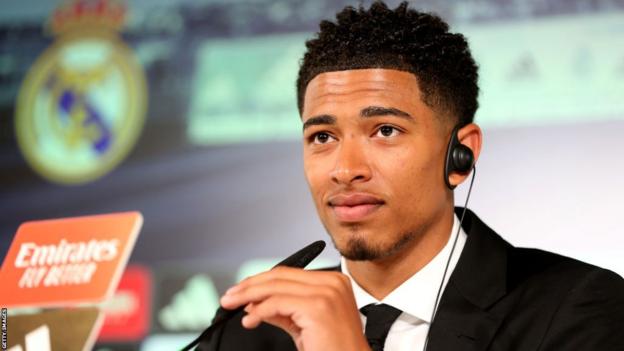
Last off-season, Xander Bogaerts opted out of his contract, hit free agency and joined San Diego Padres on an 11-year, $280m (£224.5m) deal. Signed as a 16-year-old out of Aruba, Bogaerts was a homegrown cornerstone of the Red Sox line-up.
A four-time All-Star selection and a two-time winner of the World Series, his departure, having indicated a willingness to stay, left some questioning the organisation's desire to win.
His exit echoed that of Mookie Betts in 2020. Like Bogaerts, Betts was a product of the Red Sox farm system and he was named American League Most Valuable Player in 2018, when Boston last won the World Series.
Little more than a year later, he was traded to the Los Angeles Dodgers in a deal motivated by Boston getting under the luxury tax, a payroll threshold above which teams are taxed for each dollar they spend.
Prioritising financial efficiency over Betts' prime years had, for some fans, stirred up doubts over the Red Sox owners' motivations.
Boston finished last in the AL East in 2020, 2022 and 2023, this season missing the play-offs for the third year in four since the trade. Betts, meanwhile, won the World Series with the Dodgers in 2020 and has been named an All-Star all four seasons since leaving Fenway.
"It is unfathomable that you trade a top-three player in your franchise's history in terms of talent because of money reasons when you're the Boston Red Sox," said Carrabis.
Other player departures also stung, with many fans blaming the owners for making low-ball offers, even when the team's payroll was in MLB's top five.
Before the Betts saga there was Jon Lester, traded away in the last year of his deal in 2014 when the Red Sox were on their way to a last-place finish.
Lester took up an offer with Chicago Cubs' instead and won an iconic World Series in 2016.
"He was a guy that they had drafted, he'd come up through the system, he battled and beat cancer while he was a player here," McCaffrey explained. "He endeared himself to the fanbase in a very personal way.
"I think his departure was the genesis of a lot of frustration I would say in this generation of fans."
One way to assuage that frustration is to tie down a homegrown star, which the Red Sox did last winter when slugger Rafael Devers signed a 10-year, $313.5m (£251.5m) extension.
"That went a long way with the fanbase," said Carrabis.
News of the Devers breakthrough emerged a day after Henry was booed at Fenway Park when he showed up to watch FSG's ice hockey team Pittsburgh Penguins play Boston Bruins.
"There's been a false narrative that we somehow stopped spending - completely unsupported by the facts - that we no longer sign free agents, that we are uninterested in or incapable of winning despite our track record," said Henry in February.
"I don't think anyone realises there are 30 teams in these sports every year that are all doing everything they can to win. In a particular year, some clubs are criticised because they aren't 'going for it' when they are doing every single thing they can, short of destroying their futures, to win. You always have to keep an eye on the future."
However, FSG's decision to fire general manager Chaim Bloom, whose first act of note was trading away Betts, in September suggests it isn't just the fans who are concerned with the course of the past four years and where the future might lead.
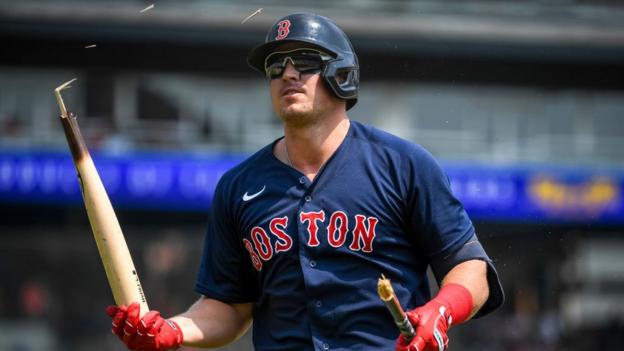
Liverpool supporters' attitudes towards their owners are generally more varied than their Red Sox counterparts, perhaps reflective of both the Premier League's global appeal and the diversity of owners they are competing with.
Vast petro-dollar wealth, of the type that has fuelled Manchester City and Newcastle's rise, does not bankroll any MLB teams.
In fact, rules that penalise big-spending owners are enforced and were updated last year with a tweak colloquially named after the New York Mets owner Steve Cohen, whose largesse had rocked the boat.
Plenty sympathise with Liverpool's owners' disadvantage in spending power and there are "three distinct groups" of fans when it comes to opinions on FSG, said John Gibbons of The Anfield Wrap.
The first - "spend, spend, spend at all costs and we want the richest owners" - will be familiar to anyone who visits Liverpool-themed corners of social media.
"There's a second who feel slightly grubby about that, but understand that the football world is changing and are slightly concerned that FSG can't keep up, which I'm probably in," Gibbons added.
"And then there is a third group whose fear of what the alternative is is greater than the desire for change."
Beyond the pitch and balance sheets, FSG's ownership of the Reds has not been without controversy.
A climbdown on a hike in ticket prices followed a 77th-minute walkout by fans in 2016. The club did not appeal in 2019 when it was unsuccessful in its attempt to trademark the word Liverpool, a move opposed by supporters' group Spirit of Shankly.
A year later the club reversed a decision to place some staff on furlough, again succumbing to the backlash. Liverpool also withdrew from the proposed European Super League when its announcement was met with condemnation from all quarters.
These controversies have mostly been background music as the team on the pitch improved and started racking up trophies. From 2016-17, Jurgen Klopp's first full season, Liverpool recorded six consecutive top-four finishes, won a first Premier League title and also lifted each of the Champions League, FA Cup, EFL Cup, Uefa Super Cup and Club World Cup.
It made Liverpool's struggles last campaign all the more stark. Klopp's insistence in October 2022 that it is "not possible" for Liverpool to compete with Manchester City in the transfer market confirmed to some fans that FSG's aim of running Liverpool as a self-sustaining business would ultimately undermine the team on the pitch.
While Liverpool's net transfer spend is estimated to be only ninth-biggest in the Premier League over the past decade, Liverpool have spent money on other things in this span.
The wages needed to retain superstars, including Mohamed Salah and Virgil van Dijk, on new contracts is one area.
The continued redevelopment of Anfield is another.
But, rightly or wrongly, transfer fees set the narrative.
And in recent transfer windows, high-profile targets - Jude Bellingham, Moises Caicedo and Aurelien Tchouameni - were lured elsewhere.
How prevalent anti-FSG sentiment is among Liverpool supporters is not easy to gauge. Those who shout loudest can drown out a quiet majority - especially on social media.
Online talk of a protest at the Chelsea game last season didn't materialise into anything of note, for example.
But when Liverpool hosted Tottenham Hotspur last April, an airplane flew over Anfield displaying a banner which read, "LFC - Sox - Penguins - Same problems FSG out".
"There's no sense really when you're in the ground of any anti-FSG feelings," said Paul Khan, chair of Spirit of Shankly.
Roberts agrees. "We're not at that point, for me, where supporters are out on the streets," he added.
Gibbons believes the momentum is towards change, however.
"My position," he said, "and I wouldn't ever say the majority position, but I think a growing number of Liverpool fans are coming around to the idea of, 'Just because they were really good owners up to a certain point, and a certain year, doesn't necessarily mean they're the best owners to go forward with'."
The conversation around FSG remains active and passionate. Gibbons and Roberts both agree that FSG is scrutinised more than the ownership of comparable clubs.
"I think one reason is that we have protested, ultimately successfully, against an ownership group before," offered Gibbons, recalling the end of Tom Hicks and George Gillett's time in charge, immediately before FSG's takeover.
Roberts suggested Liverpool's all-consuming passion for football, whether the team wears red or blue, could be a factor. The universal popularity of Klopp also leaves the fanbase without the managerial debates some others occupy themselves with.
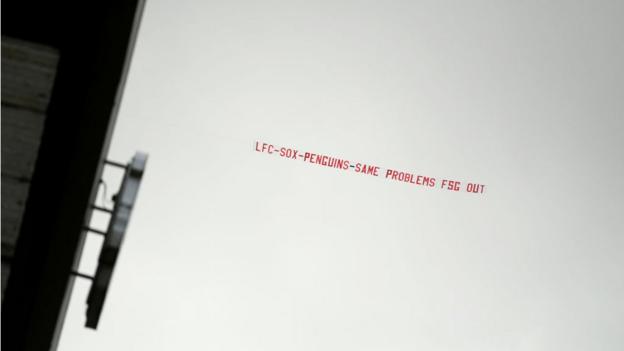
FSG's Liverpool ownership was back in the headlines in late September when it sold a minority stake in the club to investment firm Dynasty Equity.
The size of the stake was not disclosed, but it cost between £82m and £164m - less than 4% of the club's value as estimated by Forbes, even if at the top of that range.
President Mike Gordon insisted at the time that FSG's "long-term commitment to Liverpool remains as strong as ever".
It hadn't appeared to be in November 2022 when chairman Tom Werner confirmed FSG were 'exploring' a sale of Liverpool. Five months later, Henry said that was no longer a possibility and cashing in a minority stake had been the most likely outcome ever since.
Still, in FSG's growing portfolio of teams, Liverpool still stand out as they play in a league in which revenue can fluctuate considerably depending on results.
While relegation is not a serious threat to Liverpool, not qualifying for the Champions League is. It happened last season.
Even if the competition's new format gives English clubs an extra spot, Newcastle's Saudi-funded emergence as a Champions League contender means qualification is little easier.
In March, Henry called for the Premier League to implement baseball-style "limits on spending". He has previously complained that Uefa's Financial Fair Play rules lack teeth.
While the parameters of Premier League finance may be be changed by the outcome of Manchester City's alleged breaches of the division's regulations, some predict that Henry won't wait long.
With the top end of the transfer market heating up and City's legal case likely to drag on, it may be an opportune time for FSG to get out.
While ruling out an immediate sale, Henry himself said in February that FSG will not "be in England forever". Whenever they do leave, it will be with a considerable return.
FSG bought 100% of Liverpool for £300m in 2010. Its investment, based on last year's £4.25bn sale of Chelsea and educated estimates, is now worth at least 10 times their initial outlay.
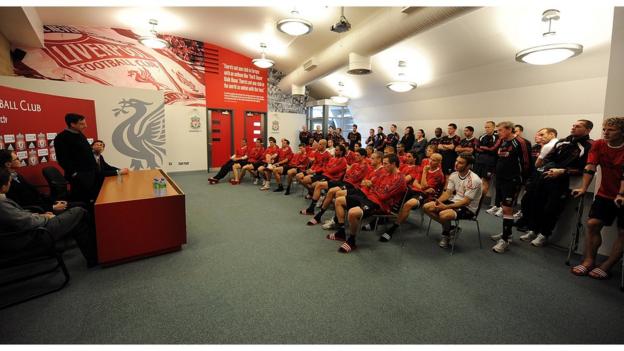
In Boston, ownership change does not appear imminent or likely.
And, despite fans' frustrations, calls to sell the team are not commonplace. One reason is a lack of obvious alternatives, another might be the knowledge that in 2023 the teams with the three biggest payrolls all missed the play-offs.
"There's no one where it's like, 'Oh, if John Henry sells the team it would be great if Person X bought it,'" Carrabis said. "There's no Person X. That would be the great unknown."
Henry, though, has had dalliances with other baseball teams. For three years, from 1999 to 2002, he owned Miami Marlins. Once upon a time he even owned shares in Boston's hated rivals, the New York Yankees.
"FSG not selling is less certain than it would have been I guess 10 years ago, that's the best way to put it," said McCaffrey.
"I wouldn't be surprised by anything at this point, and just because people have been so angry and frustrated with the direction of the team and they're aware of it. I think they hear all that."
Overall, though, the FSG family is growing. It bought the Penguins in 2021 and has partnered with Rory McIlroy and Tiger Woods' golf series TGL to form a team representing Boston.
"When they're buying new teams, that particularly seems to anger people," Gibbons said of the mood in Liverpool.
Carrabis similarly recalls "widespread panic among Red Sox fans" about the team's spending ability after FSG bought Liverpool, but adds that it has subsided significantly, partly because of the 2018 World Series, which was wrapped up after their owners' takeover on Merseyside.
If there is not widespread resentment from Liverpool fans when Boston spend money and vice versa, perhaps they can learn from one another.
Liverpool fans in particular have a track record of pressuring the owners into change, while Red Sox supporters have a longer history of FSG dealings to draw from.
After all, neither elicit much sympathy from supporters elsewhere, given the trophies both teams have won under FSG's ownership.




































